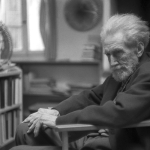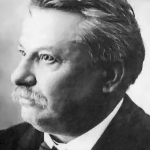With Usura
With usura hath no man a house of good stone
each block cut smooth and well fitting
that design might cover their face,
with usura
hath no man a painted paradise on his church wall
harpes et luz
or where virgin receiveth message
and halo projects from incision,
with usura
seeth no man Gonzaga his heirs and his concubines
no picture is made to endure nor to live with
but it is made to sell and sell quickly
with usura, sin against nature,
is thy bread ever more of stale rags
is thy bread dry as paper,
with no mountain wheat, no strong flour
with usura the line grows thick
with usura is no clear demarcation
and no man can find site for his dwelling.
Stonecutter is kept from his stone
weaver is kept from his loom
WITH USURA
wool comes not to market
sheep bringeth no gain with usura
Usura is a murrain, usura
blunteth the needle in the maid’s hand
and stoppeth the spinner’s cunning. Pietro Lombardo
came not by usura
Duccio came not by usura
nor Pier della Francesca; Zuan Bellin’ not by usura
nor was ‘La Calunnia’ painted.
Came not by usura Angelico; came not Ambrogio Praedis,
Came no church of cut stone signed: Adamo me fecit.
Not by usura St. Trophime
Not by usura Saint Hilaire,
Usura rusteth the chisel
It rusteth the craft and the craftsman
It gnaweth the thread in the loom
None learneth to weave gold in her pattern;
Azure hath a canker by usura; cramoisi is unbroidered
Emerald findeth no Memling
Usura slayeth the child in the womb
It stayeth the young man’s courting
It hath brought palsey to bed, lyeth
between the young bride and her bridegroom
CONTRA NATURAM
They have brought whores for Eleusis
Corpses are set to banquet
at behest of usura.
N.B. Usury: A charge for the use of purchasing power, levied without regard to production; often without regard to the possibilities of production. (Hence the failure of the Medici bank.)











Comment form: